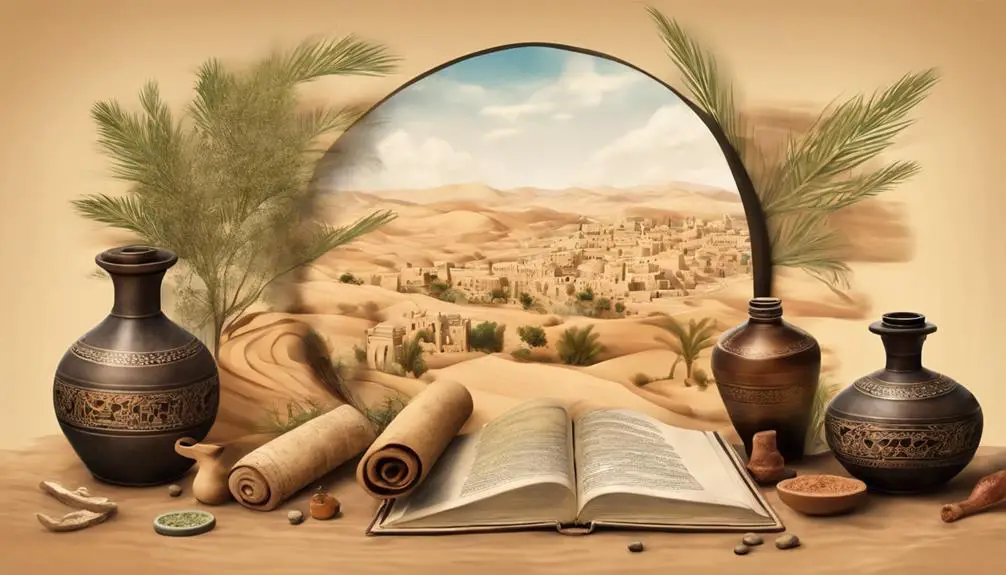Mysteries of the Bible unravel as we explore the ancient snares known as gins, revealing lessons hidden within these metaphorical traps.

What Are Gins in the Bible
Just as Daniel emerged wiser from the lions' den, you too might find enlightenment in exploring the lesser-known aspects of biblical scripture, such as gins.
In the Bible, gins refer to traps or snares set up to capture or ensnare, a concept that's both literal and metaphorical within the texts. These references, scattered throughout the scriptures, offer a fascinating glimpse into the ancient world's complexity and the symbolic layers within the Holy Book.
Unpacking the significance of gins not only sheds light on biblical times but also invites a deeper reflection on the spiritual traps that can ensnare us today. Why not embark on this journey to uncover the meanings behind these ancient snares?
Key Takeaways
- Gins symbolize entrapment by sin or temptation, reflecting deep spiritual and moral themes.
- Biblical references to gins convey trials of faith and divine testing, offering insights into human struggles.
- Different types of gins represent various spiritual ensnarements, emphasizing the metaphorical portrayal of entrapment.
- Gins carry historical and cultural significance, illustrating the universal theme of battling unseen forces and seeking divine guidance.
Definition of Gins

In analyzing the term 'gins' within the biblical context, it's essential to understand that it refers to traps or snares used historically for capturing or ensnaring. The gin origins trace back to ancient times, predating many modern trapping mechanisms. Historically, these devices were crafted from available materials such as wood, rope, and metal, ingeniously designed to trap wild animals or, metaphorically, to ensnare humans in a figurative sense.
You'll find that the concept of gins as traps in the Bible isn't just about the physical act of trapping but often symbolizes entrapment by sin or temptation. This dual interpretation underscores the richness and depth of biblical language, offering layers of meaning that extend beyond the literal.
Modern interpretations of 'gins' in scholarly biblical studies have expanded to include psychological or societal traps, reflecting the evolving understanding of what it means to be ensnared in contemporary contexts. This broadened perspective allows for a more nuanced exploration of ancient texts, bridging historical and modern experiences of entrapment and liberation. Thus, understanding gins within both their original and modern interpretations enriches one's comprehension of biblical narratives and their relevance today.
Biblical References to Gins
Understanding gins as both literal and metaphorical traps opens the door to exploring how these devices are referenced throughout the Bible. The ancient texts provide insight into the gin manufacturing process and offer a lens for modern gins interpretation, highlighting societal values and concerns of the times.
In your journey through biblical references, consider the following points:
- The use of gins in scripture often symbolizes entrapment or a test of faith, revealing deep theological implications.
- References to gins in Psalms and Proverbs showcase the wisdom literature's approach to understanding human struggles and divine justice.
- The evolution of the gin manufacturing process over time is mirrored in the changing interpretations of these biblical passages.
- Modern interpretations of gins in the Bible reflect contemporary concerns about spiritual and moral entrapments.
- Analyzing these references requires a scholarly approach, considering historical context, original language nuances, and the broader biblical narrative.
This analytical exploration offers a richer understanding of how gins, both as physical traps and metaphorical constructs, play a crucial role in biblical teachings and their application to modern life.
Types of Gins Described

When exploring the various types of gins described in the Bible, you'll find that each serves as a distinct metaphor for spiritual ensnarement or divine testing. Unlike the gin manufacturing processes known today, which involve distillation and flavoring, biblical references to gins don't describe a physical product. Instead, they metaphorically portray mechanisms of entrapment and trial.
Diving deeper, the scriptural texts often don't delineate between different gins explicitly. However, through careful analysis and comparison with modern gin interpretations, one can infer the existence of varying types. These could range from simple snares, symbolizing basic temptations or moral tests, to more complex, spiritually charged traps that might represent profound divine challenges or judgments.
The absence of a detailed taxonomy of gins within the Bible suggests that the focus is less on the physical or mechanical aspects of these traps and more on their spiritual implications. Nevertheless, the mention of gins invites readers to reflect on the nature of spiritual struggles and the omnipresence of divine testing throughout the human experience. Through this lens, the biblical gins transcend their ancient context, offering timeless insights into the nature of faith and morality.
Symbolic Meanings of Gins
Exploring the symbolic meanings of gins in the Bible reveals how these metaphors intricately represent spiritual trials and moral dilemmas faced by individuals. These symbols, deeply embedded in the text, provoke thoughtful reflection and have spurred modern interpretations and theological debates. In analyzing these metaphors, it's crucial to grasp their multifaceted significance:
- Entrapment: Gins often symbolize the entrapment of sin or temptation, illustrating how easily one can become ensnared by moral failings.
- Divine Judgment: They can represent divine judgment, serving as a reminder of the consequences that follow disobedience and unfaithfulness.
- Spiritual Warfare: The use of gins underscores the ongoing spiritual warfare between good and evil, highlighting the believer's need for vigilance.
- Salvation and Deliverance: In some contexts, escaping a gin symbolizes salvation and deliverance, emphasizing God's role as the protector and savior.
- Human Frailty: They remind us of human frailty and the need for divine guidance to navigate the complexities of life.
Through these symbols, the Bible communicates profound truths about the human condition, inviting readers to reflect on their own lives in light of these timeless lessons.
Gins in Ancient Cultures

Reflecting on the symbolic meanings of gins in the Bible offers a foundation to examine their significance in ancient cultures, where these mechanisms held both practical and metaphorical roles. In exploring gins in mythology, you'll find that these devices often symbolize entrapment or the capturing of wisdom and power. Ancient myths are replete with stories where gods and heroes are ensnared by gins, reflecting the fears and values of the societies that created these tales.
Gins in literature serve as potent symbols, too. They're used to illustrate themes of fate, destiny, and the inescapable nature of certain truths. You'll notice that authors weave gins into narratives to highlight the fragility of human freedom in the face of divine or cosmic plans. This use of gins as literary devices deepens our understanding of human struggle against unseen forces.
Analyzing gins in these contexts enriches your comprehension of their multifaceted roles across cultures. It's not just about the physical trap but also about the ideological and spiritual implications these devices carry. Through this lens, gins emerge not merely as tools of capture but as complex symbols reflecting human engagement with the divine, destiny, and the environment.
Frequently Asked Questions
How Have Modern Interpretations of Gins in the Bible Diverged From Traditional Understandings?
You've noticed modern interpretations of gins have evolved significantly due to cultural shifts and the evolution of interpretation. Scholars now view these references as more symbolic, reflecting societal fears and moral lessons rather than literal entities.
This contrasts with traditional views, which often took such references at face value. Your understanding highlights how interpretations adapt over time, influenced by changing cultural contexts and scholarly methods, leading to deeper, more nuanced readings of ancient texts.
What Role Do Gins in the Bible Play in Contemporary Religious Practices or Beliefs?
In contemporary religious practices, gins hold a nuanced position, impacting modern rituals and cultural significance.
You'll find that their role isn't just historical but deeply integrated into today's faith expressions.
They're often interpreted through a modern lens, influencing how rituals are performed and understood.
This integration showcases a dynamic between tradition and current belief systems, making gins a fascinating study of religious adaptation and relevance in the modern world.
Are There Any Notable Artworks or Literary Works Inspired by the Concept of Gins in the Bible?
You'll find that the concept of gins has indeed inspired various artistic representations and literary adaptations. These works often explore themes of entrapment and deliverance, reflecting the biblical narrative.
Artists and writers have creatively interpreted these themes, weaving them into their pieces to evoke thought and discussion.
This intersection of faith and art not only enriches our understanding of biblical texts but also highlights the enduring influence of these themes in contemporary culture.
How Do Gins in the Bible Compare to Similar Traps or Snares Mentioned in Other Religious or Historical Texts?
When you delve into ancient traps comparison, you'll find gins in the Bible have intriguing parallels with mythological snares in other texts. This analysis reveals a common theme: the use of cunning devices as metaphors for moral and spiritual challenges.
Similar snares in folklore underscore universal struggles against temptation and deceit. By examining these counterparts, you gain a deeper understanding of how cultures symbolically navigate the concept of entrapment.
What Are the Ethical Implications or Lessons Derived From the Stories Involving Gins in the Bible?
You're exploring the ethical implications of stories involving gins, delving into moral dilemmas and ethical teachings. These narratives challenge you to consider the consequences of actions and decisions.
They serve as a foundation for understanding right from wrong, emphasizing the importance of integrity and moral courage.
Conclusion
In weaving through the biblical text, you've traced the threads of gins, those snares that ancient cultures set and Scripture metaphorically unfolds. Like a hunter's trap, they symbolize entanglement in sin or hardship. Yet, this exploration isn't just an archaeological dig through antiquity—it's a mirror reflecting our own spiritual landscapes.
Gins, in their varied forms and symbolic hues, remind us of the intricate dance between divine providence and human agency, urging a cautious tread on life's precipice.



Sign up